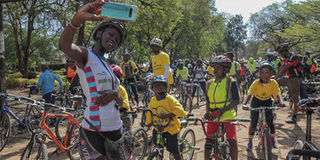Cyclists promote clean energy, decongestion of roads

Members of Critical Mass Nairobi, a cycling club, promote awareness on the advantages of cycling, at Jeevanjee Gardens on May 1, 2019. PHOTO | LEOPOLD OBI | NATION MEDIA GROUP
What you need to know:
- City cyclists say their biggest headache is lack of bicycle lanes, cycle tracks, or where they are, they are poorly designed.
- Mutura Kuria, an artist, says that one of the biggest concerns among many urban residents is accessing clean and affordable energy for cooking and lighting.
After five years of cycling and winning over 300 cyclists into her circle, Cyprine Mitchell, a Nairobi-based urban planner, decided that they would be cycling for a bigger course; like advocating for clean energy and reduction of environment pollution.
After some successes, Mitchell says they are shifting focus into having more cyclists so as to decongest the roads.
That move would also compel the government to include non-motorised lanes in its new urban road designs. “I always noticed that I spent less time on the road whenever I cycled to work, and I would also return home early enough to be with my family after work. So, we founded a cyclists’ movement known as Critical Mass Nairobi to encourage mass cycling,” explains Mitchell, adding than the cyclists’ movement was established in 2014 with seven cyclists.
The cyclists meet on the last Saturday of every month to cycle, and this event is open for all.
AWARENESS
Whereas cycling reduces carbon emissions into the environment while keeping the riders healthy, city cyclists say their biggest headache is lack of bicycle lanes, cycle tracks, or where they are, they are poorly designed.
On May 1, as the rest of the world celebrated Labour Day, Mitchell and other 600 cyclists convened at Jeevanjee Gardens in Nairobi’s central business district, then cycled through the deserted city streets before joining a gathering at the August 7 Memorial Park.
At the memorial park, a host of artists including Red Fourth Choir and other creative art performers kept the crowd entertained with performances centred on renewable energy uptake, especially in informal settlements, indoor air pollution and urban renewal.
The event came few months after President Uhuru Kenyatta assented to three key bills namely Urban Areas and Cities (Amendment) Bill 2017, Petroleum Bill 2017, and Energy Bill 2017, which establishes three national entities to manage and regulate Kenya's energy resources.
REGULATIONS
The law (Energy Bill 2017) establishes the Energy and Petroleum Regulatory Authority, the Rural Electrification and Renewable Energy Corporation (REREC) and the Nuclear Power and Energy Agency.
The Energy and Petroleum Regulatory Authority will regulate generation, importation, exportation, transmission, distribution, supply and use of electrical energy with the exception of the licensing of nuclear facilities.
The Urban areas and cities law allows county governments to review the criteria for classifying an area as a city, municipality, town or market centre.
Under the law, the population for a city has been reduced by half, from 500,000 to 250,000. This law permits a county to declare an urban area a municipality if it has a resident population of at least 50,000.
ENERGY CHAMPIONS
George Mwangala, a renewable energy campaigner, notes that new energy acts consolidates all the laws relating to energy in the Kenya, and is therefore a game changer as it creates a regulatory body, REREC, that will oversee promotion of renewable energy.
Of great interest to Kenyans, the expert says, is section 7(1) of the bill, which obligates the government to facilitate the provision of affordable energy services to all Kenyan.
“Furthermore, households and businesses who are able to generate their own energy through solar power for instance can feed their surplus to the national grid, which is a new stream of income,” Mwangala observes, adding that the new bill also allows manufacturers such as sugar millers to utilise their by-products as energy generators.
“But as much as we welcome this new development, we urge the government to ensure that these new laws are implemented,” he says.
POLLUTION
Mutura Kuria, an artist at Hope Rises, a non-government organisation based in Ruaraka, says that one of the biggest concerns among many urban residents is accessing clean and affordable energy for cooking and lighting.
“The use of charcoal and kerosene to cook results to indoor pollution. This is why we need to have a conversation around clean and sustainable energy,” Kuria notes.
Daniel Onyango, who uses Nyatiti — an eight stringed musical instrument — says that through concerts, they are using music and art to sensitise the Nairobi slum communities on the dangers of use of fossil fuels and availability of cheaper and cleaner alternatives.
The artists and cyclists also appealed to the government to develop proper infrastructures in order to provide cycling opportunities and popularise cycling transport as a culture.
Gospel disc jockey Daniel Mochai, aka DJ Gee Gee, says cyclists face a lot of bullying from other motorists who are always not willing to give them space on the road.
“Besides the misconception that people cycle because they lack bus fare, cyclists are also mistreated most of the time by motorists. I think cycling should be added into the driver’s curriculum so that drivers are taught to respect cyclists,” says DJ Gee Gee.





